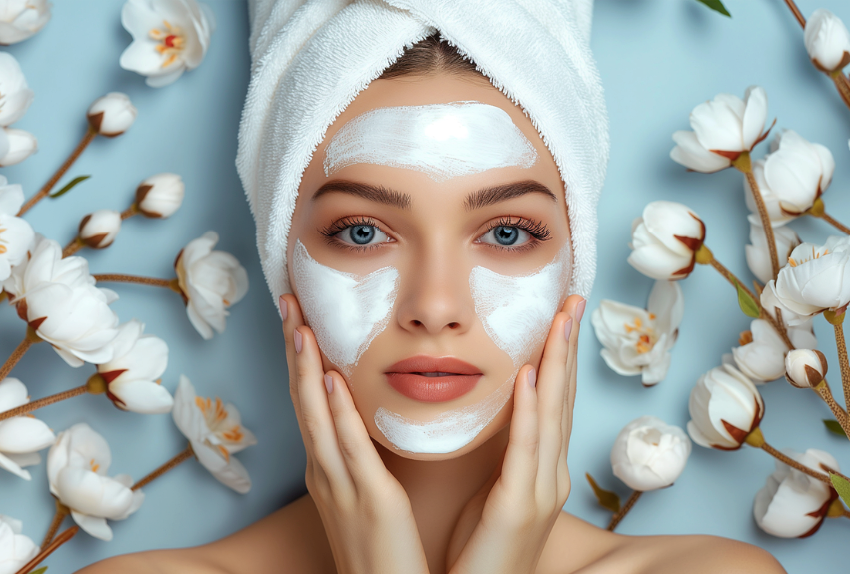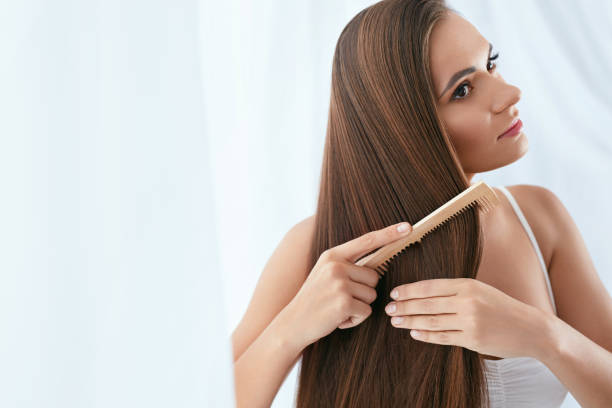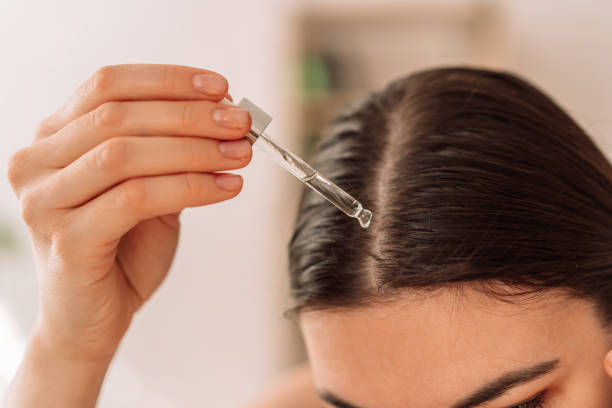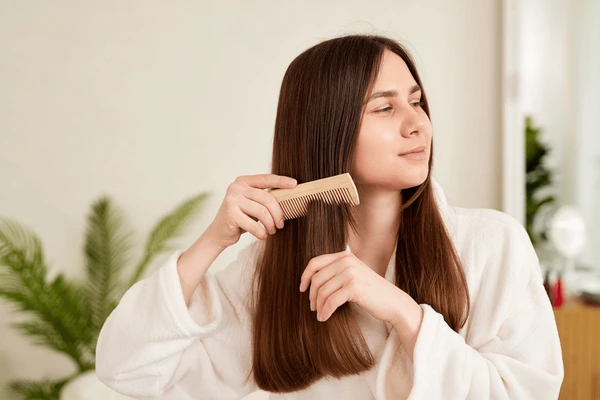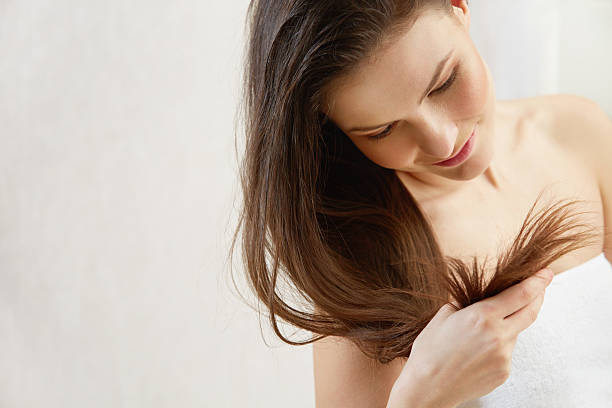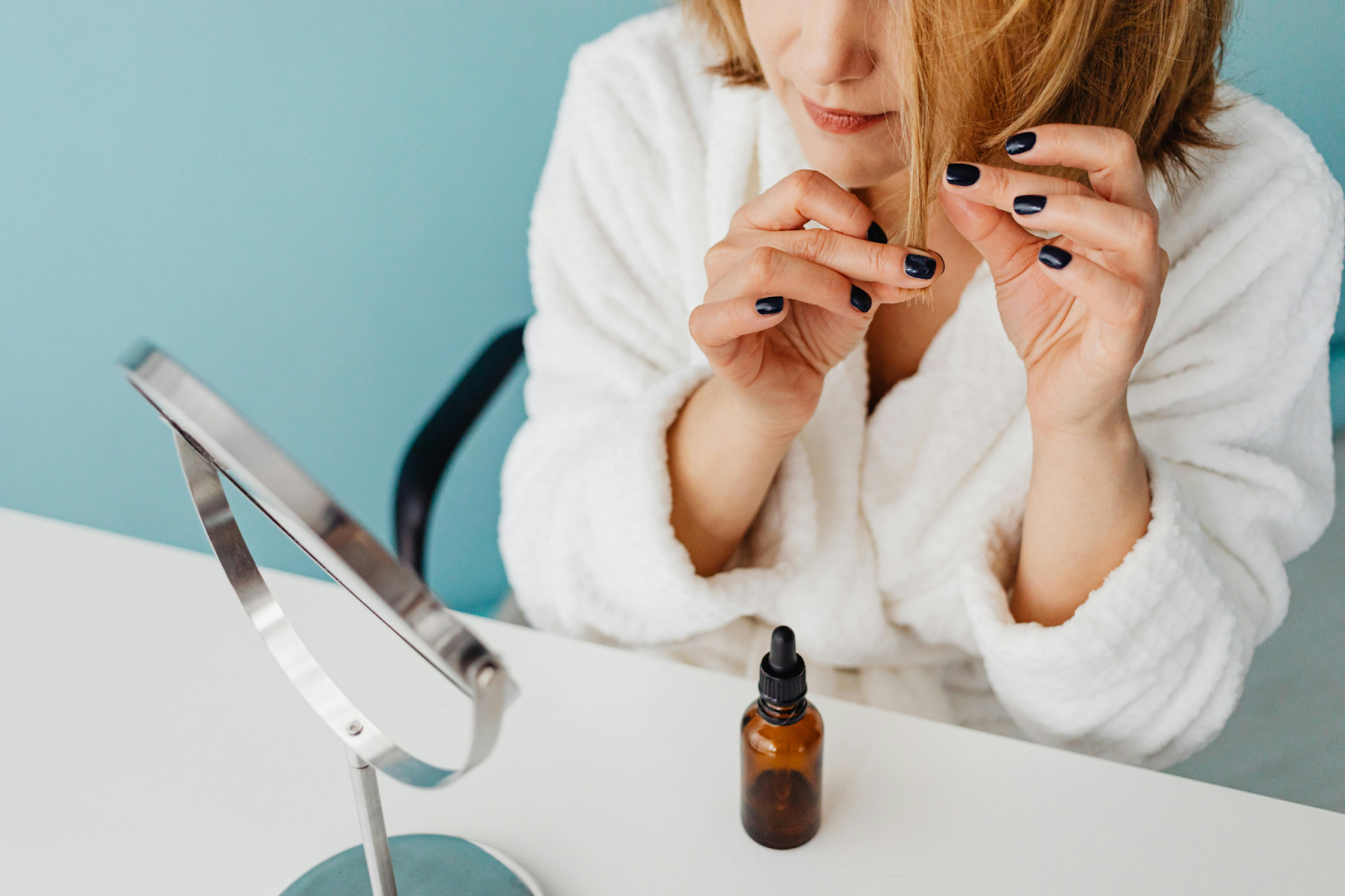Hair Loss Due To Vitamin D Deficiency: Why Does it Happen & Treatment
BY TRYBELLO
May 23, 2025

Key Takeaways
- Vitamin D is essential for maintaining the hair growth cycle, and deficiency can disrupt this process, leading to thinning and shedding.
- Lack of sunlight and a poor diet are the primary causes of vitamin D deficiency.
- Supplements, dietary sources, and sunlight exposure are common treatment options for vitamin D deficiency.
- Hair regrowth typically begins 2–3 months after vitamin D levels are restored, with significant improvements visible within 4–6 months of consistent treatment.
- Trybello's Hair Helper Spray provides complementary support for vitamin D-deficient hair with biotin and caffeine that works synergistically to strengthen follicles and stimulate growth.
Introduction to Vitamin D and Hair Health
Vitamin D is not just a vitamin; it's a major nutrient playing a vital role in many bodily functions. It supports bone health, immune function, and, yes, even hair growth. When your body lacks sufficient vitamin D, it can lead to various health issues, including hair loss.
Importance of Vitamin D
Vitamin D is crucial because it helps your body absorb calcium, which is vital for maintaining strong bones and teeth. But its benefits don't stop there. Vitamin D also supports your immune system, reduces inflammation, and plays a role in cell growth, including hair follicles.
Think of vitamin D as a gardener nurturing the soil so that plants, or in this case, hair, can grow strong and healthy. Without enough vitamin D, the "soil" becomes barren, and hair growth can suffer.
Link to Hair Growth
Hair growth is a complex process that involves the hair follicles, the tiny structures in your scalp. Vitamin D receptors are present in these follicles, and they help regulate the hair growth cycle. When vitamin D levels are low, hair follicles can become dormant, leading to hair thinning and loss.
Studies have shown that people with certain types of hair loss, like alopecia areata, often have lower levels of vitamin D. Getting enough vitamin D levels is essential for maintaining healthy hair.
Common Misconceptions
One common misconception is that hair loss is solely genetic. While genetics plays a significant role, nutritional deficiencies can also contribute to hair loss. Another myth is that vitamin D can only be obtained from sunlight. While sunlight is a significant source, vitamin D can also be found in foods and supplements.
Understanding these misconceptions can empower you to take control of your hair health by addressing potential nutritional gaps.
“Doctor-Approved Natural Spray Rapidly Boosts Growth & Thickness.
Why 100,000+ Women Are Switching to The TryBello All-Natural Solution!"
Join over 100,000 happy customers who’ve transformed their hair with our natural, doctor-formulated spray—rated 4.8/5 by more than 40,000 real users.
Proven Natural Ingredients
- • Caffeine Extract – Naturally blocks DHT and boosts blood flow to hair follicles
- • Biotin – Absorbs directly through the scalp for maximum results—no pills needed
- • Castor Oil – Soothes inflammation and locks in deep, lasting moisture
- • Rice Water Extract – Packed with proteins and minerals to strengthen hair and reduce shedding
Get Visible Results in 12 Weeks
- • Up to 45% increase in hair thickness
- • Reduces shedding and unclogs hair-draining nightmares
- • Supports regrowth in thinning areas
- • Leaves hair soft, shiny, and full of life
Ironclad 120-Day Growth Guarantee
No results after 4 months? Get 100% of your money back—no questions asked.


★★★★★
I started using this twice a day because I noticed my hairline receding. Didn’t pay attention to track results, now my stylist told me my hair has grown a lot since my last root touch up. I'm impressed! - Bailey

Causes of Vitamin D Deficiency
Inadequate Sun Exposure
Sunlight is a primary source of vitamin D, as UV rays help your skin synthesize this essential nutrient. However, spending too much time indoors, using sunscreen excessively, or living in areas with limited sunlight can lead to inadequate vitamin D production.
It's a delicate balance between protecting your skin from harmful UV rays and getting enough sunlight for vitamin D synthesis. Finding that balance helps you maintain healthy vitamin D levels.
Poor Dietary Intake

Your diet plays a crucial role in maintaining adequate vitamin D levels.
Foods like fatty fish, egg yolks, and fortified dairy products are excellent sources of vitamin D. However, if your diet lacks these foods, you might not be getting enough of this vital nutrient.
Health Conditions Impacting Absorption
Digestive disorders like Crohn's disease or celiac disease can affect vitamin D absorption. Also, obesity can lead to lower blood levels of vitamin D, as it gets stored in fat tissues.
Understanding these causes can help you identify potential reasons for your vitamin D deficiency and take steps to address them.
Symptoms of Vitamin D Deficiency
General Symptoms
Vitamin D deficiency doesn't just affect your hair; it can impact your overall well-being. Common symptoms include fatigue, muscle weakness, and bone pain. You might also experience mood changes, such as feeling down or more irritable than usual.
These symptoms can be subtle and easily overlooked, but they are important indicators that your body might need more vitamin D.
Hair Loss Indicators

Vitamin D deficiency can significantly affect the hair growth cycle and cause hair loss.
You might notice increased shedding, where more hair than usual falls out during brushing or showering. Hair might also appear thinner, especially at the crown or around the temples.
Another indicator is slower hair growth. If you find that your hair isn't growing as quickly as it used to, or if it feels less full, vitamin D deficiency could be a contributing factor. Hair loss isn't always obvious at first, so paying attention to these subtle changes is crucial.
Other Related Health Issues
Beyond hair loss, vitamin D deficiency can lead to other health concerns. One significant issue is weakened bones, which can increase the risk of fractures. This happens because vitamin D helps your body absorb calcium, essential for bone strength.
Additionally, a lack of vitamin D can weaken your immune system, making you more susceptible to infections and illnesses. Some people may also experience mood changes, such as feeling more anxious or depressed. Recognizing these symptoms early can help you take steps to improve your health.
Treatment Options
Dietary Sources of Vitamin D
Incorporating vitamin D-rich foods into your diet is a natural way to boost your levels. Some excellent sources include:
- Fatty fish like salmon, mackerel, and sardines
- Egg yolks
- Fortified foods such as milk, orange juice, and cereals
- Cheese and other dairy products
Including these foods in your daily meals can help increase your vitamin D intake and support hair health.
Sunlight Exposure Guidelines

Sunlight is a natural source of vitamin D, but try to balance sun exposure with skin protection.
Aim for about 10–30 minutes of midday sun several times a week, depending on your skin type and location. This exposure allows your skin to produce vitamin D efficiently.
However, be cautious not to overexpose yourself, as too much sun can lead to skin damage. If you're concerned about UV exposure, consider getting your vitamin D from other sources, such as diet and supplements.
Supplementation Advice
When dietary changes and sunlight aren't enough, vitamin D supplements can be an effective solution. Choose the right supplement and dosage based on your specific needs. Consulting with a healthcare provider can help determine the appropriate dosage, as individual requirements can vary.
Taking supplements as directed can help restore your vitamin D levels and improve hair health over time. Keep in mind that while supplements can be beneficial, they should not replace a balanced diet and healthy lifestyle. Always prioritize natural sources of vitamin D when possible.
Monitoring and Dosage Recommendations
Regular monitoring of your vitamin D levels is essential, especially if you're taking supplements. Your healthcare provider may recommend periodic blood tests to ensure your levels are within the optimal range.
Also, follow dosage recommendations carefully. Taking too much vitamin D can lead to toxicity, causing symptoms like nausea, weakness, and kidney problems. Therefore, always adhere to the guidance provided by your healthcare professional.
Restoring Vitamin D-Deficient Hair with Trybello: Your Complete Solution
Vitamin D plays a major role in hair follicle function, and insufficient levels can disrupt the natural growth cycle, leading to thinning and excessive shedding. The good news is that with proper identification and treatment, this type of hair loss is typically reversible.

We've developed our Hair Helper Spray as the perfect complement to your vitamin D restoration journey.
At Trybello, our Hair Helper Spray works through a unique Nutrient Synergy Complex specifically designed to amplify the benefits of improving vitamin D levels. While your body works to rebuild internal vitamin D stores, our spray delivers a precise combination of follicle-stimulating compounds directly to your scalp, creating the optimal environment for recovery.
What truly differentiates our approach is the inclusion of rice protein and ginger extract, ingredients that help balance sebum production, often disrupted during vitamin D deficiency. At the same time, it delivers amino acids that serve as building blocks for new hair growth.
Don't let vitamin D deficiency continue to diminish your hair's vitality. Join the thousands of satisfied customers who have already restored their hair's natural beauty and strength today!
TRY YOUR BELLO HAIR HELPER SPRAY NOW →
Frequently Asked Questions (FAQs)
Trending Topics
See our latests posts #TRYBELLO




